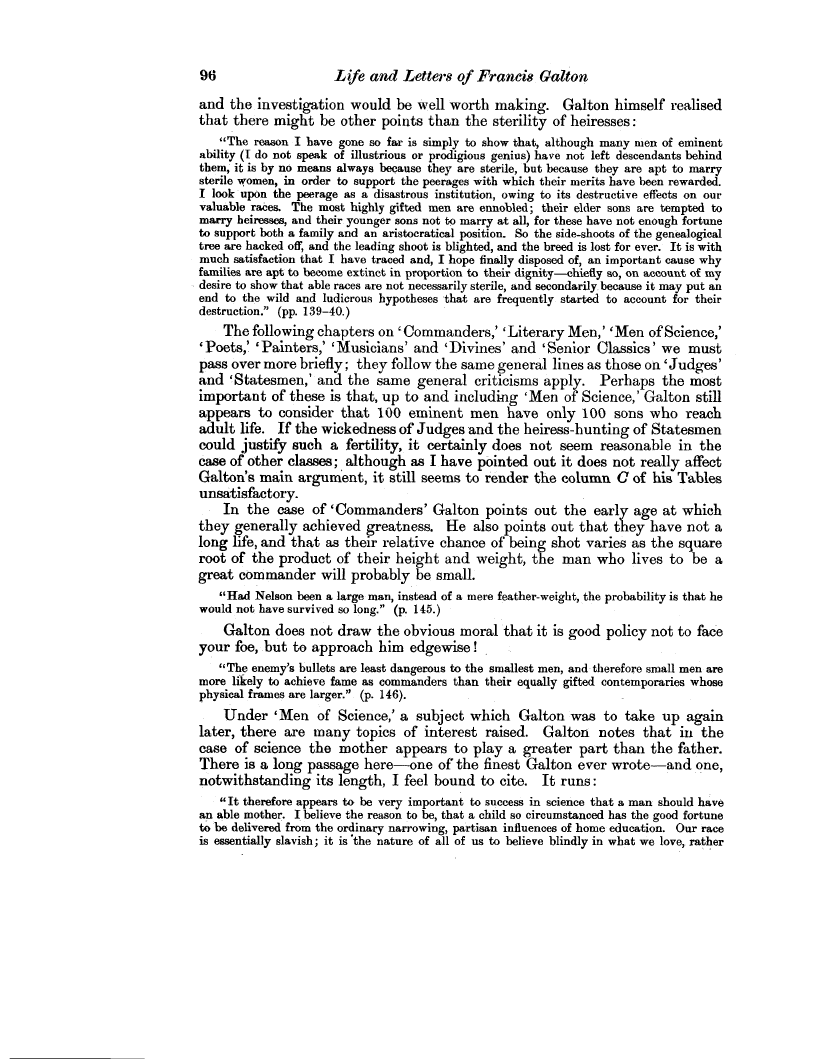96 Life and Letters of Francis Galton
and the investigation would be well worth making. Galton himself realised that there might be other points than the sterility of heiresses
"The reason I have gone so far is simply to show that, although many men of eminent ability (I do not speak of illustrious or prodigious genius) have not left descendants behind them, it is by no means always because they are sterile, but because they are apt to marry
sterile women, in order to support the peerages with which their merits have been rewarded. I look upon the peerage as a disastrous institution, owing to its destructive effects on our valuable races. The most highly gifted men are ennobled; their elder sons are tempted to marry heiresses, and their younger sons not to marry at all, for these have not enough fortune to support both a family and an aristocratical position. So the side-shoots of the genealogical tree are hacked off, and the leading shoot is blighted, and the breed is lost for ever. It is with much satisfaction that I have traced and, I hope finally disposed of, an important cause why families are apt to become extinct in proportion to their dignity-chiefly so, on account of my desire to show that able races are not necessarily sterile, and secondarily because it may put an end to the wild and ludicrous hypotheses that are frequently started to account for their
destruction." (pp. 139-40.)
The following chapters on 'Commanders,'' Literary Men," Men of Science,' `Poets,' 'Painters,' `Musicians' and `Divines' and `Senior Classics' we must pass over more briefly; they follow the same general lines as those on `Judges' and `Statesmen,' and the same general criticisms apply. Perhaps the most important of these is that, up to and including `Men of Science,' Galton still appears to consider that 100 eminent men have only 100 sons who reach adult life. If the wickedness of Judges' and the heiress-hunting of Statesmen could of such a fertility, it certainly does not seem reasonable in the case of other classes; although as I have pointed out it does not really affect Galton's main argument, it still seems to render the column C of his Tables unsatisfactory.
In the case of 'Commanders' Galton points out the early age at which they generally achieved greatness. He also points out that they have not a long life, and that as their relative chance of being shot varies as the square root of the product of their height and weight, the man who lives to be a great commander will probably be small.
"Had Nelson been a large man, instead of a mere feather-weight, the probability is that he would not have survived so long." (p. 145.)
Galton does not draw the obvious moral that it is good policy not to face your foe, but to approach him edgewise !
"The enemy's bullets are least dangerous to the smallest men, and therefore small men are more likely to achieve fame as commanders than their equally gifted contemporaries whose physical frames are larger." (p. 146).
Under `Men of Science,' a subject which Galton was to take up again later, there are many topics of interest raised. Galton notes that in the case of science the mother appears to play a greater part than the father. There is a long passage here-one of the finest Galton ever wrote-and one, notwithstanding its length, I feel bound to cite. It runs
"It therefore appears to be very important to success in science that a man should have an able mother. I believe the reason to be, that a child so circumstanced has the good fortune to be delivered from the ordinary narrowing, partisan influences of home education. Our race is essentially slavish; it is 'the nature of all of us to believe blindly in what we love, rather

